Labour Migration to Taiwan :
Leveraging Responsible Recruitment for Sustainable Development
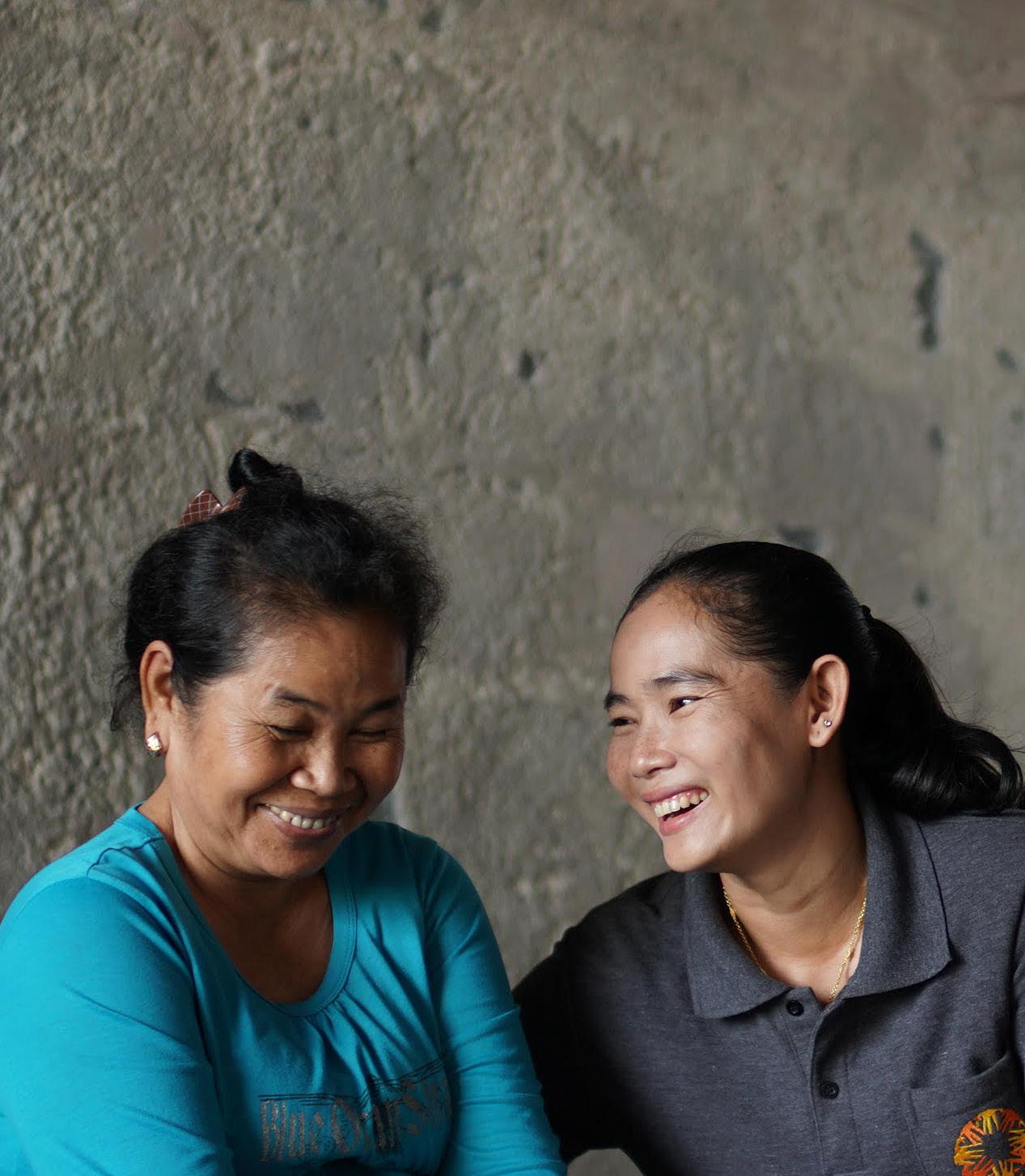

WORK BETTER INNOVATIONS POLICY SERIES POLICY BRIEF NO. 2 / 2024 MARCH 2024
Authors
Shuhan Lin and Dr Bonny Ling
Shuhan Lin and Bonny Ling, “Labour Migration to Taiwan: Leveraging Responsible Recruitment for Sustainable Development,” Work Better Innovations, March 2024, https://www.wbi.org.uk/publications/ policybrief-2-2024/
Acknowledgements
We are grateful to Professor Yu-Fan Chiu of the School of Law, National Yang Ming Chiao Tung University for collaboration on the Taiwan Project for Business and Human Rights. We thank Nicholas Haggerty and Wan-Hsiang Hsu for helpful reviews and edits, Wenchi Chang for translation support and 66 Fu for layout. We thank Randy Mulyanto for his work on the migrant stories featured in this brief. He interviewed the two Indonesian migrant workers in January 2024 in Taiwan.
© Work Better Innovations (WBI) All Rights Reserved.
Work Better Innovations (WBI) allows the free reproduction of excerpts from this publication for educational and advocacy purposes, provided full and proper acknowledgement and citation are given.
You must ask and receive permission from Work Better Innovations (WBI) for the reproduction and translation of this publication. A full-text PDF of this policy brief is available to download from wbi.org.uk/publications
Work Better Innovations
Innovation Space, Halpern House 1-2 Hampshire Terrace, Portsmouth PO1 2QF England
T : +44 7984 222216
hello@wbi.org.uk



@workbetterinnov
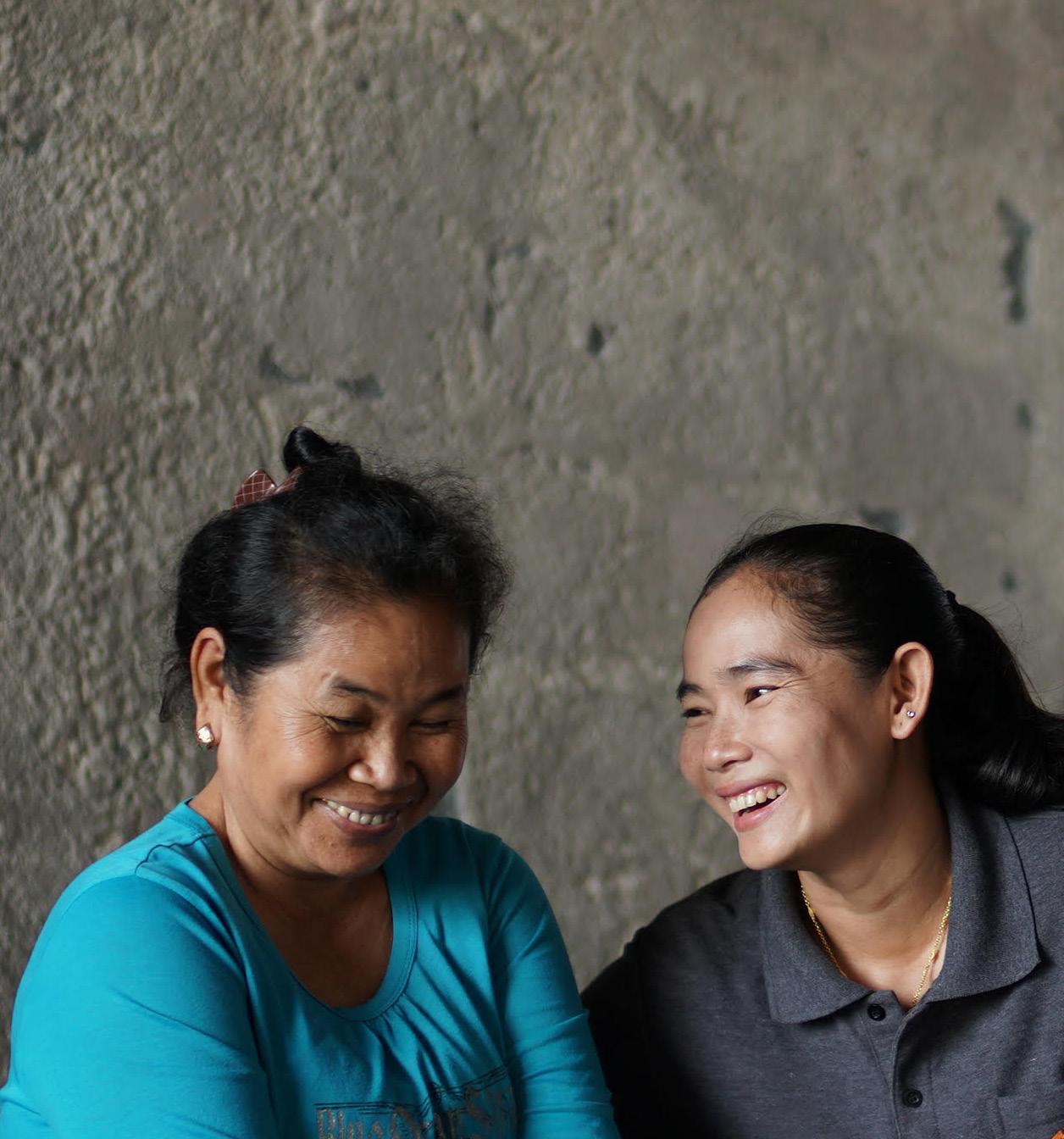
Work Better Innovations (WBI) is a social enterprise on a mission to support an inclusive and sustainable economy. We work innovatively on projects for business and human rights and have strong subject matter expertise in international law and standards.
We are the proud recipient of an Innovation Award for Community Innovation in Portsmouth, UK. Our community service is aimed at building a more inclusive and sustainable economy, from the ground up.
The Taiwan Project on Business and Human Rights is a special project between Work Better Innovations and the School of Law, National Yang Ming Chiao Tung University. The project’s goals are to provide accurate and authoritative research on business and human rights and to educate young scholars, corporate leaders, and practitioners on responsible economic growth in Taiwan. In doing so, the Taiwan Project builds the capacity needed to support business enterprises in Taiwan on human rights and environmental due diligence.
www.wbi.org.uk

WBI.ORG.UK | 2
COVER PHOTO: ©ILO/PICHIT PHROMKADE. MIGRANT COMMUNITY IN RAYONG,THAILAND.
 PHOTO BY DANIEL M. SHIH
PHOTO BY DANIEL M. SHIH
Introduction
Taiwan industrialised rapidly in the decades after World War II. It underwent a transformation from an agricultural society into an Asian manufacturing hub, driven by small and medium enterprises (SMEs).
Today, Taiwan is a global powerhouse in sectors such as semiconductors and electronics, where strategic long term governmental investments have shifted Taiwanese exports from low-value to highvalue and specialised goods.
These economic changes have steadily taken place in Taiwan since the 1960s. Taiwan is now the sixth largest economy in East and Southeast Asia.1 As the island rapidly industrialised, it underwent significant rural-urban migration and saw declining population growth as it moved from its agrarian roots. Taiwan experienced labour shortages, especially in the sectors that require labour-intensive work.
In response to domestic labour shortages, Taiwan opened its labour market to foreign workers in 1989. This was followed in May 1992 with the government passing the Employment Service Act (ESA), setting out a highly regulated labour migration system of foreign workers in Taiwan in the two broad employment sectors of productive industries and social welfare.
WBI.ORG.UK | 3
1 The World Factbook,“Country Comparisons: Real GDP (purchasing power parity),” CIA.gov, undated. Taiwan is ranked 6th in gross domestic product at purchasing power parity for the region of East and Southeast Asia, after China, Japan, Indonesia, South Korea and Thailand.
Purpose and Methodology
The purpose of this Policy Brief is to outline the important contributions that migrant workers in Taiwan make to sustainable development outcomes in their countries of origin via remittances.
The brief will discuss the economic benefits of remittances sent by migrant workers in Taiwan, as well as the associated loss or delay of positive development outcomes owing to the flawed labour recruitment system where migrant workers bear their recruitment fees and related costs of their job placement in Taiwan.
We make use of statistics on migrant remittances from official sources, where available, and secondary reports, such as news reports, to illustrate the scale of the economic benefits and losses, as well as delays in development potential.
To frame these statistics on the lived experiences of migration, this Policy Brief features two stories of Indonesian migrant workers in Taiwan to understand the costs associated with their employment, as well as the benefits of their remitted earnings. These benefits are in addition to the important contributions they make to Taiwan’s economy.
For clarity on the terms of labour recruitment as used in Taiwan, this brief should be read in conjunction with Work Better Innovations Policy Brief No. 1 / 2023, released in December 2023, on understanding the English-Chinese terminology of recruitment fees and related costs in Taiwan.
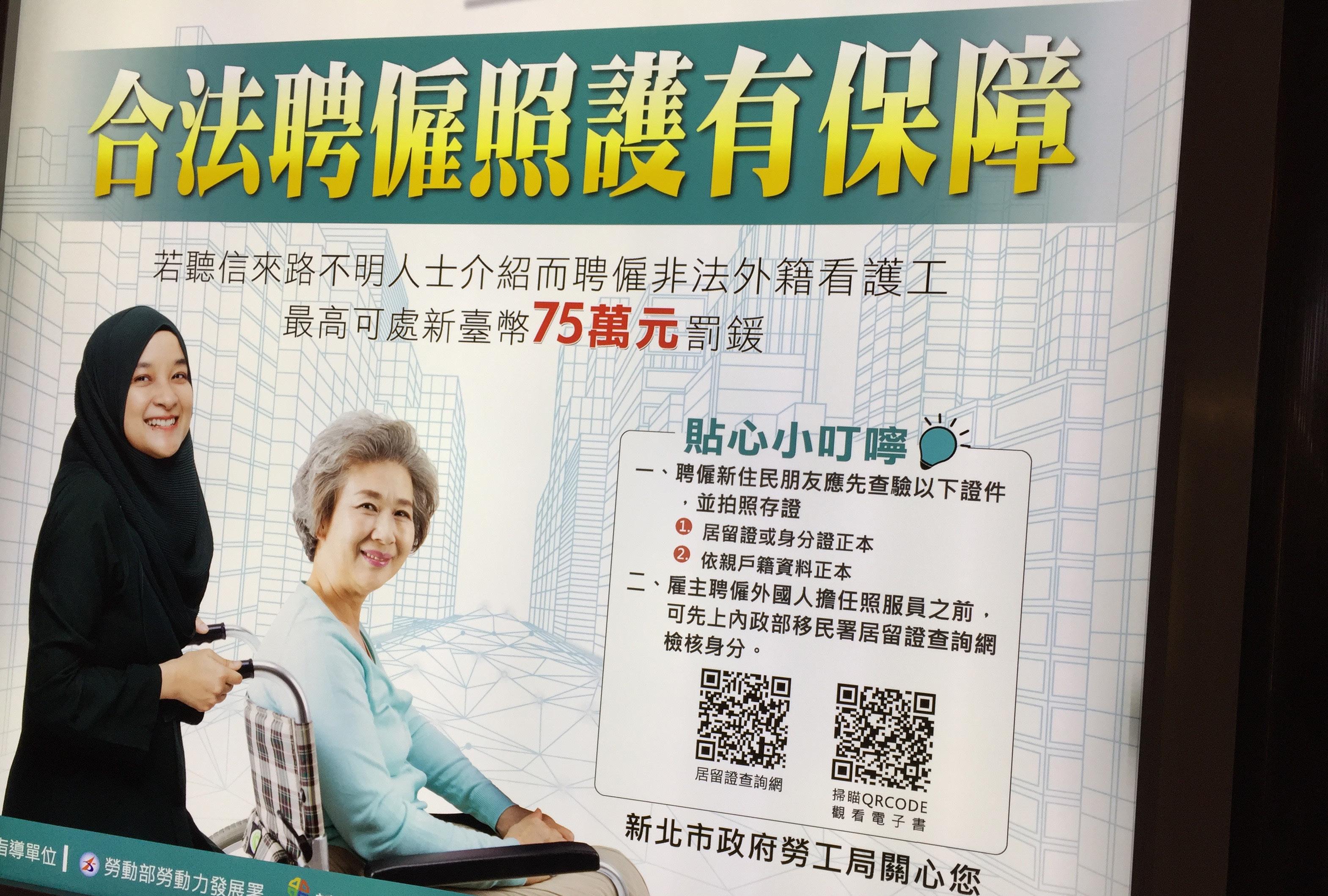
WBI.ORG.UK | 4
PHOTO
BY BONNY LING
Importance of Remittance in Global Development
Migrant remittances have grown significantly in recent decades. Figures have risen from US$31.3 billion in 1990 to US$76.8 billion in 20002 and are projected to reach US$860 billion in 2023.3 As these records do not include cash transfers or informal channels, the actual volume of remittances is believed to be higher.
Remittance flows significantly stabilise income and improve social welfare in countries of origin. The consistent financial support serves as a lifeline, enabling millions of households to access food, shelter, education, and healthcare, which can directly or indirectly reduce poverty.
On a national scale, remittances have increasingly become a less volatile source of foreign currency amid world economic shifts. Recent evidence has shown that remittance flows remained strong during COVID and registered a smaller decline than previously projected, thus highlighting remittances’ pivotal role as a resilient economic stabiliser.4
Remittances are the primary source of external finance for many low- and middle-income countries. They have exceeded foreign direct investment and official development assistance as the largest source of external finance for many countries in the Global South as countries decrease their development aid.
Economic Benefits of Migrant Remittances from Taiwan
Mirroring the global picture of the important economic contributions made by migrant workers to the domestic economy in their countries of origin, statistics from the Banking Bureau of Taiwan’s Financial Supervisory Commission indicate that two licensed migrant remittance businesses in Taiwan, Welldone Company [統振] and Eastern Union Interactive Corporation [東聯互動], facilitated close to NT$25.6 billion (about US$818 million) in total remittances during the first half of 2023, with each transaction averaging around NT$10,000 (about US$320).5
As of December 2023, there are 753,430 documented migrant workers in Taiwan from its four
migration corridors with Indonesia, the Philippines, Thailand and Viet Nam. Funds were remitted to these countries of origin for Taiwan’s established labour migration corridors, with an article from the American Chamber of Commerce in Taiwan reporting in August 2022 that migrant workers in Taiwan, on average, remit around US$500 a month, which could total more than US$4 billion in annual overseas remittance flow.6
Nevertheless, the actual volume remitted by migrant workers in Taiwan is believed to be much higher than official figures, given that these estimates do not include cash remittances transfers or informal money transfers.
2 Hein de Haas, “Social Policy and Development Programme Paper Number 34: Remittances, Migration and Social Development: A Conceptual Review of the Literature,” United Nations Research Institute for Social Development (October 2007): 1.
3 Dilip Ratha, Vandana Chandra, Eung Ju Kim, Sonia Plaza, and William Shaw, “Migration and Development Brief 39: Leveraging Diaspora Finances for Private Capital Mobilization,” World Bank (December 2023): 1.
4 World Bank Group, “Press Release: Defying Predictions, Remittance Flows Remain Strong During COVID-19 Crisis,” 12 May 2021.
5 謝方娪, “The Third International Money Transfer Company, Digital Idea Approved to Operate Remittance for Migrant Workers [第3家小額跨境匯款 數位至匯獲准經營移工匯兌],” Central News Agency, 27 July 2023.
6 Jens Kastneron, “Taiwan Business Topics: Fintech Brings Migrant Worker Remittance Business Above Ground,” American Chamber of Commerce in Taiwan, 24 August 2022.
WBI.ORG.UK | 5
 PHOTO BY RANDY MULYANTO
PHOTO BY RANDY MULYANTO
For the first three quarters of 2023, the total amount remitted by Indonesian migrant workers in Taiwan was US$1.3 billion. A small fraction were sent by a worker named Sukati.
Sukati works as a migrant domestic worker in Taipei. She is originally from a village in Jember in East Java. She has two daughters, whom she has not seen for more than six years.
Sukati takes care of an 86-year-old grandfather and a 79-year-old grandmother. Her work hours sometimes extend to midnight. She helps prepare their meals, changes diapers and administers medication every day.
Sukati has worked for at least five Taiwanese households. She currently earns NT$30,000 net per month. Her latest contract with her banking executive employer was done through direct hiring, instead of going through a labour recruitment agency.
She describes her current employer as “really kind,” who provides her with “a monthly allowance, net,
and covers [her] medical [check-up] and ID card.”
Sukati’s employer is helping her stay in Taiwan for the long term. In April 2022, Taiwan’s government created a new classification for migrant workers with six years of experience. This new classification, called “intermediate skilled manpower,” provides a pathway to permanent residency in Taiwan.
She said migrant domestic workers would need to return to their home countries after working for 14 years in Taiwan.7 Under the new system and with the new ID card, she could stay here longer.
Sukati had one dream after starting work in Taiwan. “[My] dream is to bring my [youngest] daughter here for a university degree. But she does not want to,” Sukati said, adding that her employer would let both of them live together. Her employer, she said, would also pay for her daughter’s flight tickets and tuition fees in Taiwan.
“It is not easy. Not everyone has a good employer here.”
7 The maximum length of stay for the majority of migrant workers in Taiwan, as per Article 52 of the Employment Service Act, is 12 years. In limited cases, some migrant workers in domestic care work under Art. 46(9) of the same Act may be able to stay up to 14 years.
WBI.ORG.UK | 6
Human Rights Due Diligence Lost and Delayed Development Potential
Migrant workers in Taiwan remitting funds back home is a powerful lever for positive development outcomes. This builds on what we already know on the economic importance of remittance for communities and households in migrants’ countries of origin.
While the celebratory narratives serve as justifications of migrant workers’ toils in Taiwan, it can overlook how unfair practices during the labour recruitment process can curtail the development benefits of migration through the collection of recruitment fees and related costs from migrant workers.
We identify in this policy brief three ways for how this development potential can be lost or delayed through unfair recruitment process in the labour migration to Taiwan:
(1) Collection of the legally permitted monthly service fees from migrant workers.
(2) Recruitment fees that are prohibited under Taiwanese law but collected in the country of origin that are reportedly shared with Taiwanese labour brokers.
(3) Illegitimate, unreasonable and undisclosed costs that migrant workers pay to find new employers in Taiwan owing to their restricted job mobility.
Monthly Service Fees
For many migrant workers in Taiwan, what they can remit home can be much less than what they had initially expected. A key reason is the monthly recurring service fees they pay to their labour brokers in Taiwan. This is legally permitted in Taiwan, under the Standards for Fee-charging Items and Amounts of the Private Employment Services Institution, Article 6.
An international report by FairSquare in 2021 on fair recruitment between the Philippines and Taiwan estimated, on an annual basis, that “the recruitment sector in Taiwan earns approximately US$484 million in fully legal monthly service fees from its foreign workers.”
What is the monthly service fee collected from migrant workers in Taiwan?
See Work Better Innovations Policy Brief No. 1 / 2023, Recruitment Fees and Related Costs in Taiwan: Dictionary of English-Chinese Terms for an explanation of this and other fees collected in the labour recruitment process to Taiwan.

WBI.ORG.UK | 7
PHOTO BY THOMAS TUCKER ON UNSPLASH

Recruitment Fees and Related Costs
In Taiwan, a 2023 legislative research paper found that migrant workers from Viet Nam typically pay some of the highest recruitment fees and related costs in Viet Nam for their jobs in Taiwan. Compared to workers from other corridors, the recruitment fees paid by Vietnamese migrant workers are reportedly as high as US$5,000 to 6,000 for their employment in Taiwan.
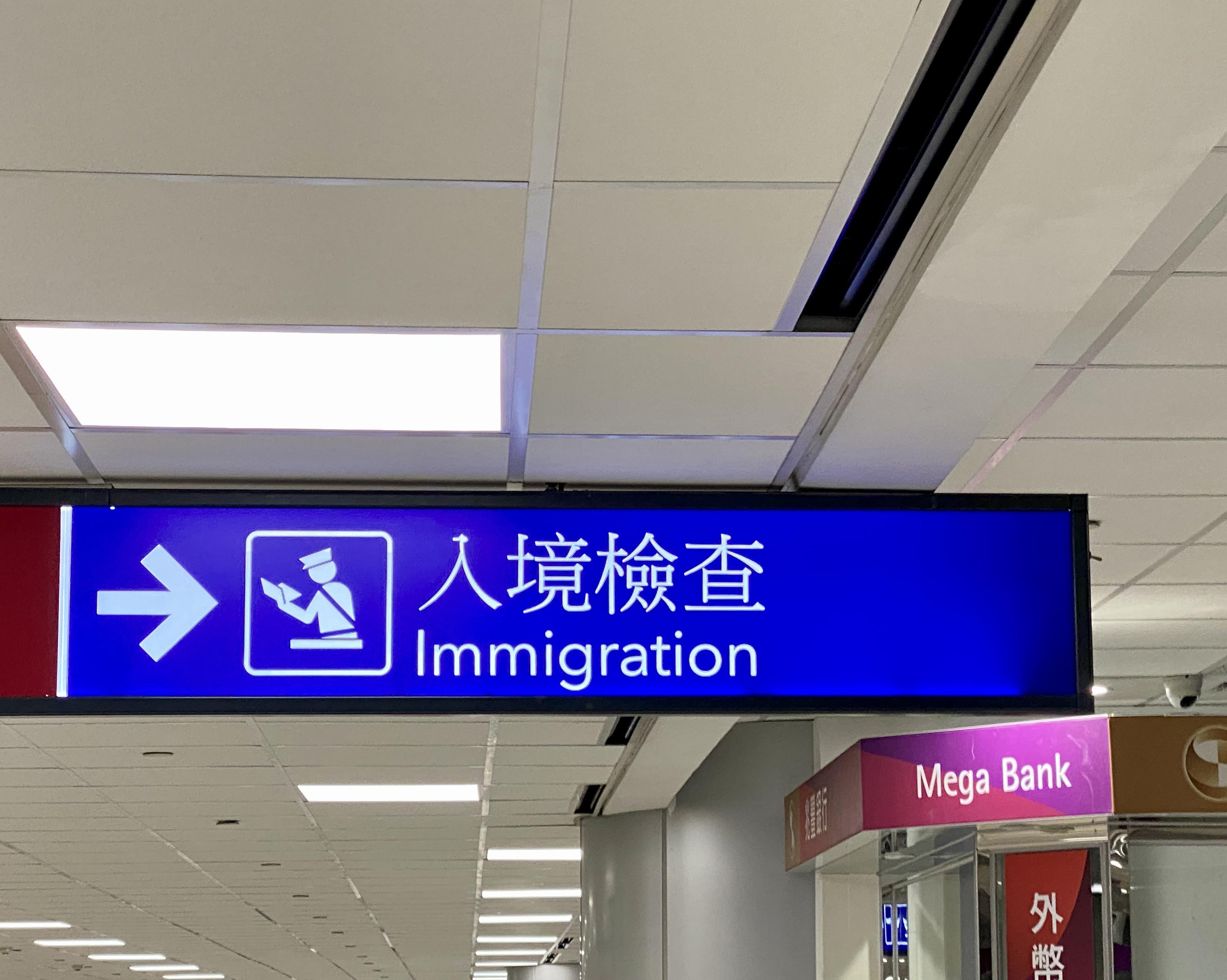
Payment of Illegitimate, Unreasonable and Undisclosed Costs for Job Mobility
Unlike high-waged foreign workers, low-waged foreign workers in Taiwan have restricted job mobility because their employment permission is tied to their sponsoring employers. If migrant workers leave their original employer, they have 60 days to find new employers without breaching the terms of their visa, according to Article 11 of the Directions of the Employment Transfer Regulations and Employment Qualifications for Foreigners Engaging in the Jobs Specified in Items 8 to 11, Paragraph 1, Article 46 of the Employment Services Act
Paying a substantial amount of undisclosed fees to labour brokers can be common when migrant workers seek to change employment in Taiwan, despite its strict legal prohibition under Article 40 of the Employment Service Act. These fees are illegitimate, unreasonable and undisclosed, as reflected by its colloquial name of “job purchasing fee,” reportedly between NT$35,000 to 80,000 It is often during this period of between employers and bearing the extra costs for changing jobs that many migrant workers decide to abscond. Labour brokers can be fined 10 to 20 times of the job-purchasing fees and their operation licence can be revoked for one year.8
WBI.ORG.UK | 8
PHOTO BY BONNY LING
[移工遭收買工費係屬違法 勞動部將積極查處],” 5
8 Workforce Development Agency, Ministry of Labor, “Job-Purchasing Fees Charged to Migrant Workers Are Illegal, Ministry Will Investigate Actively
May 2020.
PHOTO BY BONNY LING
Another manner in which the development potential is lost or delayed through unfair recruitment practices in labour migration to Taiwan is the collection of recruitment fees and relatedcosts in the country of origin.
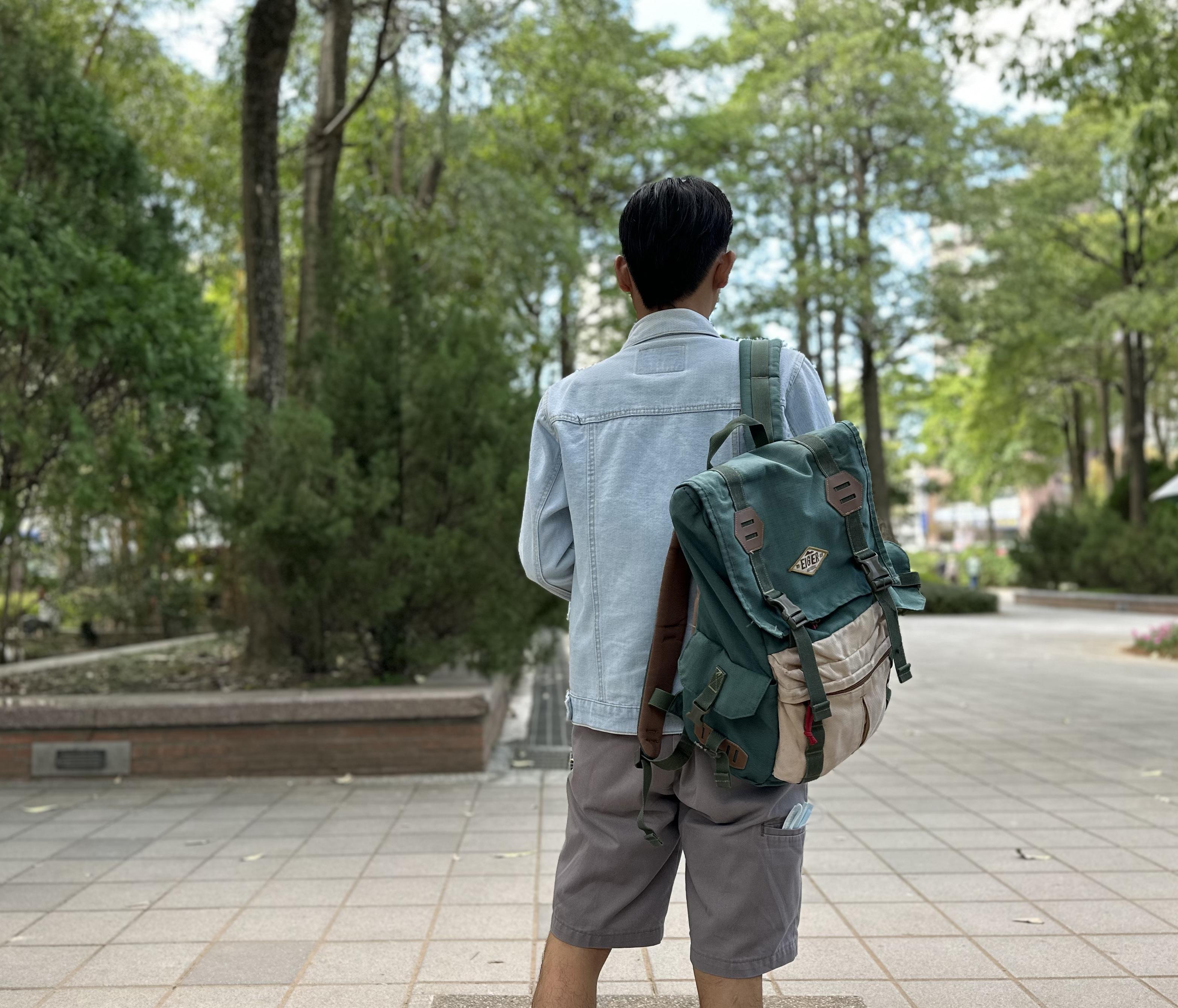
Yoga is from Cicurug, Sukabumi Regency in Indonesia’s West Java. He works in Hsinchu, Taiwan as a machine operator for cable coils.
Yoga secured his employment in Taiwan through an agent, instead of direct hiring. He did his medical check-up and had his Indonesian passport and Taiwan ID card processed through the same agent.
Yoga waited for around three months to get his job in Hsinchu; he declined to reveal how much he paid the agent.
He prefers to work late hours for extra money. “We look for [jobs] that have overtime.”
He doesn’t know how long he will stay in Taiwan, but he hopes to start a business in Indonesia.
Yoga called for Taiwanese society to show greater respect to his fellow migrant workers. At the same time, he reports that his working conditions are good for him.
He said Taiwan was his first time working abroad. “I worked odd jobs in Indonesia. It was difficult looking for jobs. I followed people here and there — like it or not.” He made “four, five times as much” his monthly wages back home.
“But from our salary, there are still charges,” Yoga said, in reference to salary deductions for monthly dormitory fees, meals, and labour broker service fees, along with the taxes and health insurance fees that all workers in Taiwan pay.
WBI.ORG.UK | 9
WBI.ORG.UK | 9
PHOTO BY RANDY MULYANTO
Positive Development Outcomes
As Taiwan’s number of migrant workers have increased from the time the island first opened its labour market to foreign workers in 1989, so has the positive development impacts of the remittances sent home. Migrant remittances from Taiwan contribute to positive human development outcomes in household income, increased access to housing and promote quality education in the migrants’ countries of origin.
In terms of the UN Sustainable Development Goals (SDGs), there are positive outcomes enabled by labour migration to Taiwan for the migrant workers and their families, particularly in the progress for the following SDGs:
• SDG 1: No Poverty
• SDG 2: Zero Hunger
• SDG 3: Good Health and Well-being
• SDG 4: Quality Education
• SDG 5: Gender Equality
• SDG 6: Clean Water and Sanitation
At the individual level and beyond an analysis of economic benefits, labour migration can also be an important driver of personal growth, job training experience and upskilling, new skill and language acquisition that can open additional opportunities for the migrant.
Vietnamese workers represent the largest group of migrant workers in Taiwan.
According to official data, there were 263,263 Vietnamese migrant workers in Taiwan as of December 2023, and they provide more than half of the migrant workforce for the productive industry sectors.
Most of the Vietnamese migrant workers in Taiwan come from the northern provinces in Viet Nam that have high unemployment rates and low socioeconomic development.9 In most cases, migrant workers are a key source of income for their families and successfully improve household income back home.
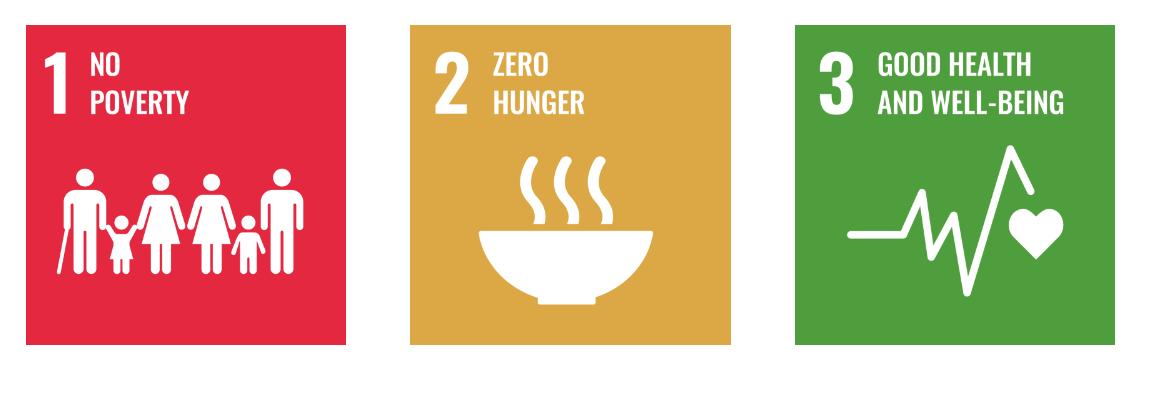
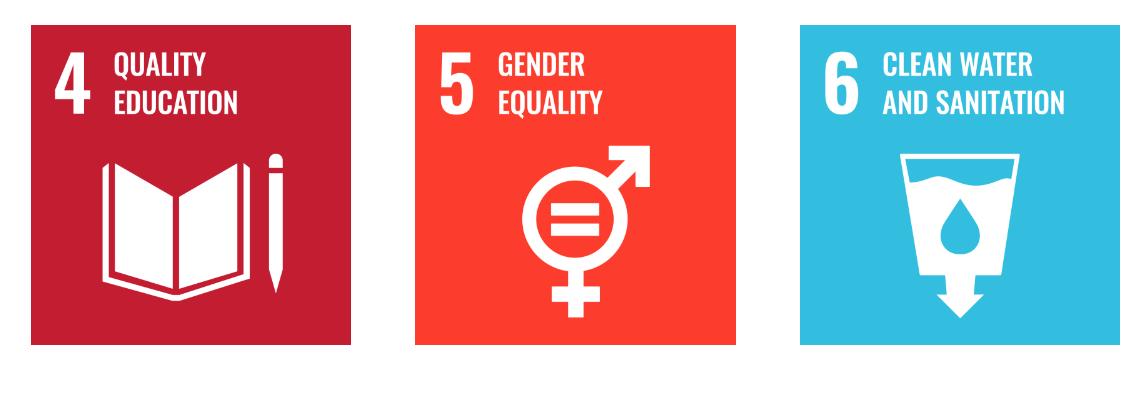

WBI.ORG.UK | 10
9 Global Fund to End Modern Slavery, “Estimating the Prevalence of Forced Labor among Vietnamese Adult Migrant Laborers to Japan/Taiwan,” June 2021, p. 11.
Higher Household Income
One study cited the statistic that, on average, Vietnamese workers who migrate to Taiwan for employment reported a higher annual family income of Vietnamese Dong 144.56 million (about US$6,000), when compared to the national average of Vietnamese Dong of 132.6 million (about US$5,400) per rural household.10
The improved financial situation of Vietnamese migrant families is likely attributed to the overseas employment of the migrant family member working in Taiwan. The consistent financial support remitted home serves as a lifeline, enabling households in migrant workers’ country of origin to reduce poverty and also access to housing and education.
Promote Quality Education
After helping their parents to purchase land and build a family home, the next priority for many of the Indonesian women migrants interviewed was to contribute to their siblings’ education and wedding. Remaining funds would then be dedicated to their own children’s education or saving for their own houses when they eventually return back to Indonesia.
Another report points to an example of three siblings in high school in Thuận Hóa in central Viet Nam, whose combined monthly rental fees and living stipend of Vietnamese Dong 7 millions (US$300) all come from the funds remitted by their mother who has been working in Taiwan for nine years.
Increased Access to Housing
An academic study of Indonesian female migrant workers in Taiwan illustrated these positive development outcomes for the interviewed women, who sought employment abroad to improve their household income in Indonesia. For many of the women interviewed, their earnings from the first three years of their employment in Taiwan typically go towards helping their parents to buy land and build a family home.
Remittances as Support During Crisis
Confirming the global importance of remittances as an economic stabiliser, funds remitted by migrant workers in Taiwan also serve as a steady and resilient source of foreign currency especially during economic downturns for the countries of origin.
The Philippines experienced higher inflation in 2023 than in previous years. From January to July 2023, the amount of funds remitted home by overseas Filipino workers was 2.9 percent higher than the same period in 2022; with 2.7 percent of the total global remitted amount sent by Filipino workers in Taiwan, approximating NT$16.21 billion (US$507 million).11
10
WBI.ORG.UK | 11
Ibid., p. 15. 11 黃紫緹, “Filipino Migrants in Taiwan Remit US $507 in The First 7 Months in 2023 among High Inflation in Philippine [家鄉 通膨居高不下 2023前7個月菲律賓移工從台灣匯回國5.07億美元],” Taiwan News, 19 September 2023.

Supporting Entrepreneurship
Migrant remittances from Taiwan also provide a pathway of poverty alleviation through entrepreneurship. Many returned migrant workers found their own shops or became self-employed as a way of reintegration into their home communities. Their entrepreneurship journey becomes not only a means of livelihood but can also be a significant driver for local economic growth and contribute to maintaining cultural ties with the country where the returned migrant workers once lived.12
Remittances alone cannot address challenges of marginalisation, development inequalities and lack of employment opportunities in migrants’ countries of origin. Nevertheless, recruitment fees and related costs borne by migrant workers are funds that do not go towards the realisation of development potentials for themselves and their family members.
This can translate into delayed positive outcomes in health, education and per capita income of the migrant’s household under the global sustainable development roadmap.
WBI.ORG.UK | 12
12 See Palmira Bachtiar and Dinar Dwi Prasetyo, “Return Migration and Various Reintegration Programs for Low-skilled Migrant Workers in Indonesia,” SMERU Research Institute, February 2017.
PHOTO BY IRFAN HAKIM ON UNSPLASH

Conclusions
With the burden of recruitment fees not yet fully shifted to employers, as is the norm for high-wage foreign workers, the current labour migration system diminishes and delays the positive sustainable development potential made by migrant workers through their remittances.
Having migrant workers bear the cost of their recruitment also limits their contribution to sustainable development in Taiwan. To repay and service the debts associated with their cross-border recruitment, many migrant workers need overtime hours.
As a result, migrant workers have limited time outside of work and rest, reducing their chances of learning Chinese or vocational training as a form of lifelong learning (SDG 4). Their limited free time can also curtail SDG progress in, for instance, health and well-being (SDG 3), reduce inequalities (SDG 10) and fully involve migrant workers in promoting peaceful and inclusive societies for sustainable development (SDG 16).
Recommendations for Taiwan
To fully leverage labour migration for positive impacts for the SDGs and avoid loss and delays in development potentials, Taiwan must:
• Fully understand the various recruitment fees and related costs —and potentially also illegitimate and undisclosed costs—in the entirety of the migration process and be proactive in shifting the full cost of recruitment to employers.
• Actively work with the governments of the countries of origin to reduce the economic burdens before their departure to Taiwan and paying recruitment fees and related costs in the countries of origin.
• Fully implement SDG Target 10.c to reduce to less than 3 percent the transaction costs of migrant remittances and eliminate remittance corridors with costs higher than 5 percent.
WBI.ORG.UK | 13
PHOTO BY JUN HONG TAN ON UNSPLASH
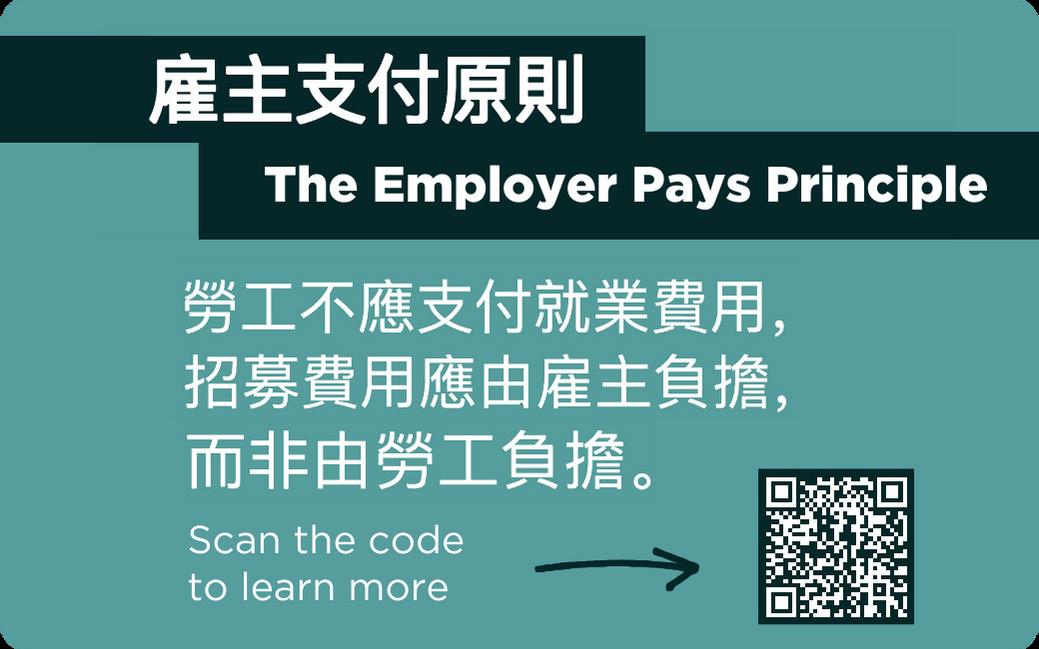
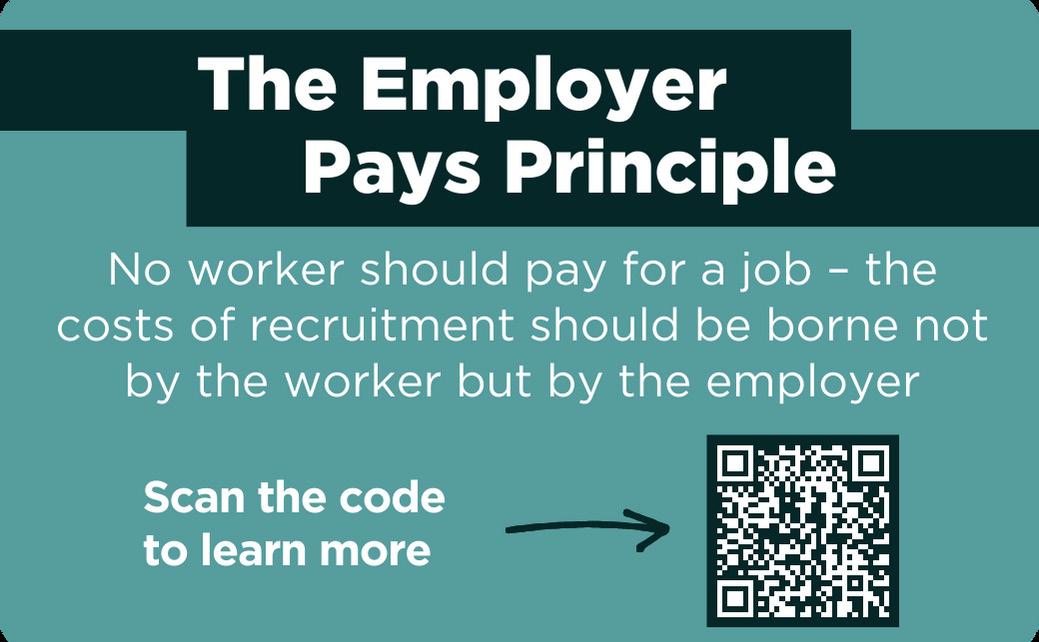
Employer Pays Principle Taking Root in Taiwan
In recent years, significant intergovernmental and business momentum has been placed on advocacy for the responsible recruitment of migrant workers that places the full cost of recruitment on their employers. Yet, the Employer Pays Principle, where “no worker should pay for a job [where] the costs of recruitment should be borne not by the worker but by the employer” has not yet fully taken root in any jurisdiction worldwide.
Some manufacturers in Taiwan have begun to implement the Zero Fees recruitment of migrant workers, meaning that employers bear all the costs of recruitment, including the monthly service fees collected from migrant workers that are legally permitted under Standards for Fee-charging Items and Amounts of the Private Employment Services Institution, Art. 6
In July 2023, the government’s oversight body, the Control Yuan, found that the Zero Fees recruitment of migrant workers is a global development. With an increasing number of mandatory human rights due diligence regulations from abroad, it is already a reality facing Taiwanese employers (see our Policy Brief No. 1 / 2024).
The persistent practice of collecting recruitment fees and related costs from migrant workers harms
Taiwan’s human rights image abroad and must become a priority on the legislative reform agenda.
Beyond the scale of remittances sent by migrant workers in Taiwan to improve annual household incomes and lift communities out of poverty, the sustainable development potential is fundamentally about people’s ability to thrive: lead a long and healthy life, have access to education, and a decent standard of living.
Development benefits of labour migration to Taiwan is therefore not only an issue about remittances, but is central to realise people-to-people exchange essential to Taiwan’s economic and cultural ties with its regional neighbours, especially its policy for the Asia Pacific.
In the years ahead, migration for livelihood and employment will become an ever-increasing phenomenon to mitigate the displacement impacts of climate change. Integrating responsible recruitment and human rights in labour recruitment benefits sustainable development in Taiwan’s migration corridors and prepares it to be economically resilient.
WBI.ORG.UK | 14
Innovation
T:




Work Better Innovations
Space, Halpern House 1-2
Hampshire Terrace, Portsmouth PO1 2QF England
+44 7984 222216
www.wbi.org.uk
hello@wbi.org.uk @workbetterinnov




 PHOTO BY DANIEL M. SHIH
PHOTO BY DANIEL M. SHIH


 PHOTO BY RANDY MULYANTO
PHOTO BY RANDY MULYANTO










